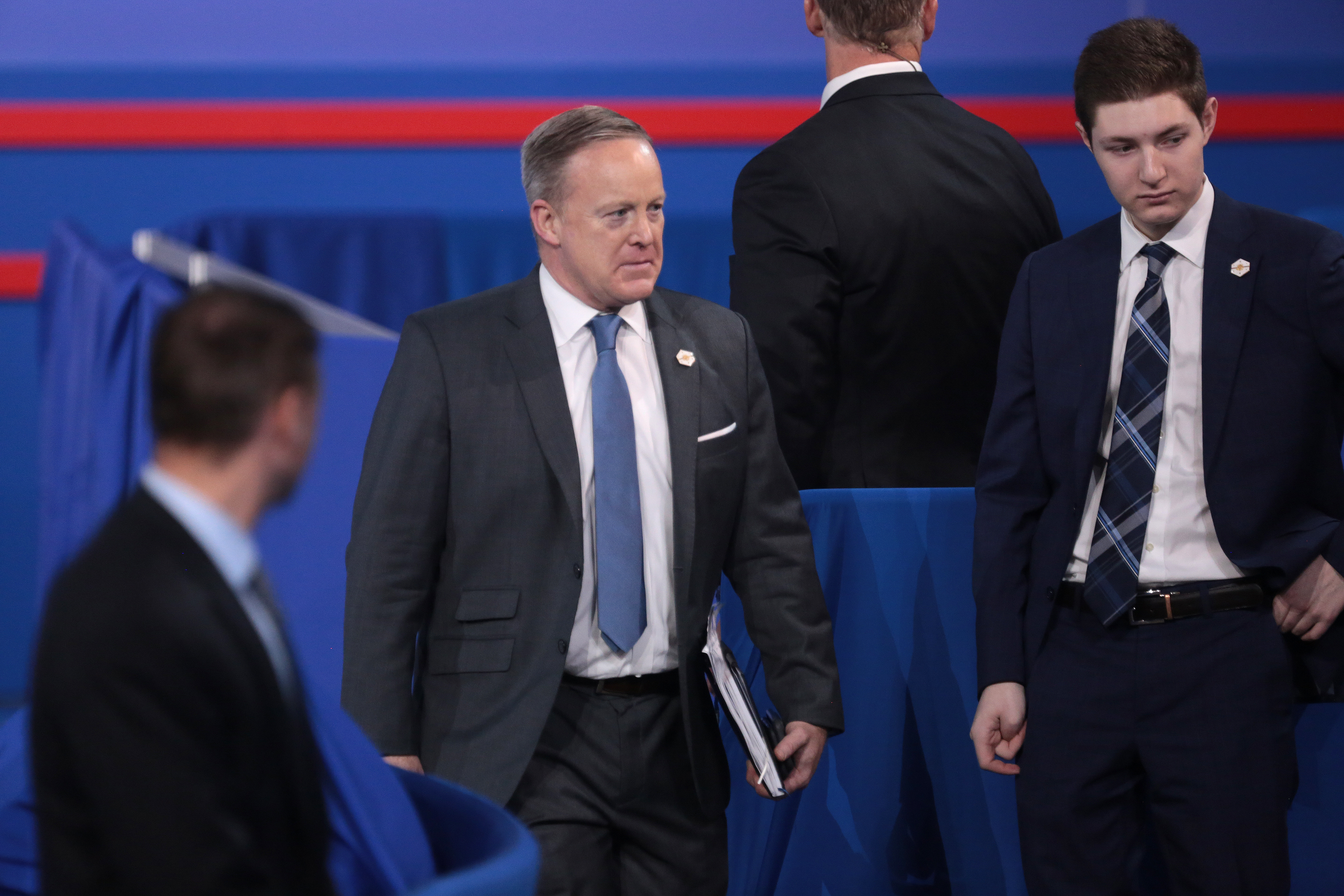A line delivered at the 69th annual Emmys this year had viewers questioning if they were watching an awards show or the dystopian Black Mirror; former Press Secretary of the White House Sean Spicer rolled out on a podium — in a clear reference to Saturday Night Live’s satirization of him — sternly pointed his finger, and in direct allusion to his notorious lie regarding the 2017 inaugural crowd, declared, “This will be the largest audience to witness an Emmys, period– both in person and around the world.” On a night dedicated to celebrating television’s best, it seems only fitting that one of the stars of the season’s most riveting series– the White House– performed.
The entire night took on an uncharacteristically political tone, a reflection of the effect the current state of the nation has had on media content. Veep, The Handmaid’s Tale, and Saturday Night Live were but three of the many shows that raked in awards for their commentary on and satirization of government. Though largely an exhibition of liberalism, the Emmys acted as a servant in the media’s tendency to blur the line between reality and entertainment in the Trump era, while also underscoring the power of celebrity.
The satirization of politicians and current affairs is not a new phenomenon, nor is it inherently problematic. On the other hand, it can, and often is, a component of a healthy discourse on current affairs.
The issue with Spicer’s Emmy cameo does not lie in its employment of parody. Rather, the pressing problem is that liberal media outlets that regularly criticize certain politicians give those same people a platform to normalize their offenses through comedy and disingenuous modesty. The sensationalization of politicians and their behavior prioritizes celebrity and, furthermore, sets a precedent that any inappropriate actions can be redeemed through a self-effacing media appearance.
This normalization of abnormal behavior can be particularly observed in Donald Trump’s hosting of Saturday Night Live in 2015. During his opening monologue, the president —then candidate— said, “I’m a nice guy. I don’t hold grudges against anybody, like Rosie O’Donnell. She said some things about me that were hurtful and untrue. I said some things about her that were mean, but completely accurate.” The comments Trump is referring to were part of a series of verbal attacks he carried out against O’Donnell, which primarily targeted her physical appearance. He callously remarked once, “We’re all a little chubby, but Rosie is just worse than most of us… [she] is a very unattractive person, both inside and out.”
Allowing Trump to satirize himself and his bullying-behavior aids him in neutralizing the atrociousness of his prior claims and actions. While it would be a stretch to assert that these monologues have excused his demeaning and unacceptable remarks, it does shroud them with humility and a level of self awareness that make him a more relatable character. That being said, he is careful not to ever fully deride his character– but instead that of someone else, and in this case, O’Donnell. At that moment in his campaign, after being constantly portrayed — and projecting himself— as such an extreme individual, humanization is exactly what Trump needed; luckily for him, Saturday Night Live and The Tonight Show with Jimmy Fallon were happy to provide those platforms. When commenting on Trump’s hosting, Saturday Night Live writer Tim Herlihy claimed that, “nobody thought there was a prayer of him being elected.” While that may be true, the possibility that Trump’s appearance on the show had any influence on the outcome of the future election is not acknowledged.
The current political climate is one undeniably driven by celebrity. Trump’s most compelling component as a presidential candidate was that he was an utterly inexperienced, but already famous man– a truth that led him to be viewed as completely incompetent to the left, and refreshingly uncorrupt to the right. His brash statements, erratic behavior, and shocking tone kept him on the cover of every newspaper and on the tip of every tongue. And while many liberal news outlets derided their counterparts for the sensationalization of Trump’s erraticism, these headlines and discussions’ publicity and familiarization of the president ultimately contributed to his election. In fact, studies show that the media’s portrayals of Trump during the election gave him $2 billion worth of free coverage. By constantly putting on blast Trump’s comments and erraticism without criticism, certain media outlets distracted the public from the actions of other candidates. The media fueled this fascination with Trump as a character, even when it was deriding him. Thus, Trump’s celebrity and the media’s sensationalization around him have opened the floodgates for media stars and politicians to become indistinguishable in the collective view of the American political system. What will this mean for the 2020 election?
Spicer’s appearance on the Emmys cannot be compared to Melissa McCarthy’s impersonation of him on Saturday Night Live; the latter is satire, while the former is a past government official’s admission of giving false statements, veiled by a shocking layer of irony. Political satire performed by actors is humorous criticism, whereas political satire by politicians is the normalization of the offenses being critiqued. By allowing politicians to make fun of their own past mistakes, the media is distancing them from their actions when they should be held accountable. While media outlets promoting anti-Trump ideals should continue to express political statements through mockery and parody, they should be wary about giving their subjects a stage on which they can display their humanity.
